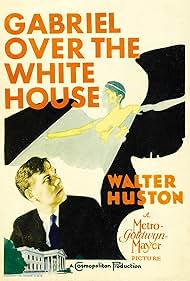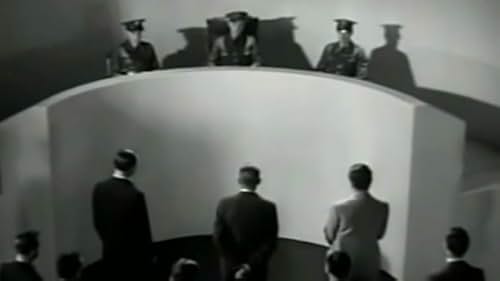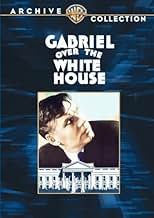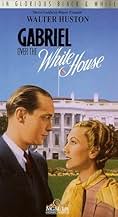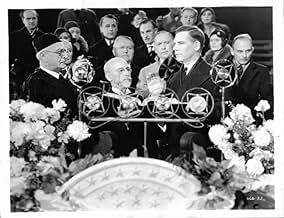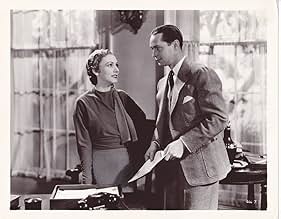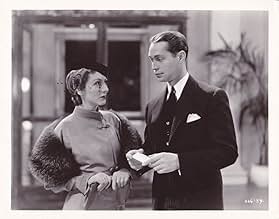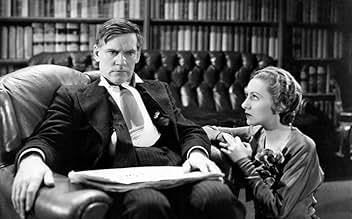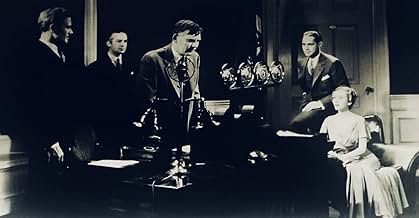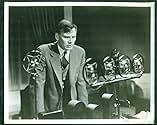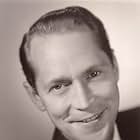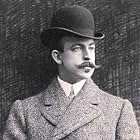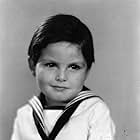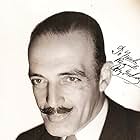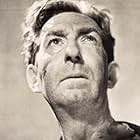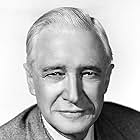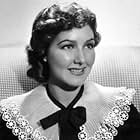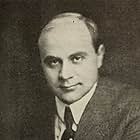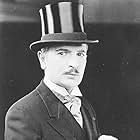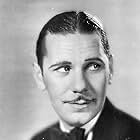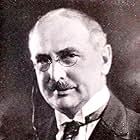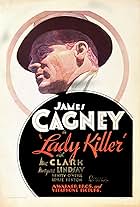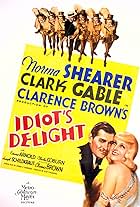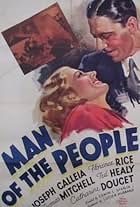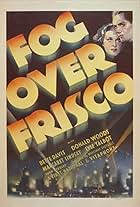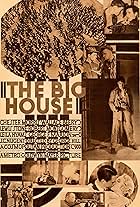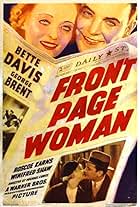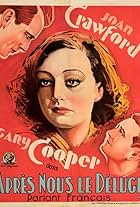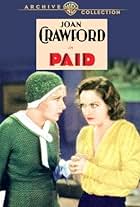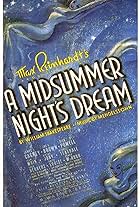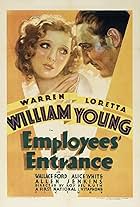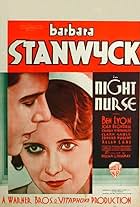NOTE IMDb
6,4/10
1,5 k
MA NOTE
Ajouter une intrigue dans votre langueA political hack becomes President during the height of the Depression and undergoes a metamorphosis into an incorruptible statesman after a near-fatal accident.A political hack becomes President during the height of the Depression and undergoes a metamorphosis into an incorruptible statesman after a near-fatal accident.A political hack becomes President during the height of the Depression and undergoes a metamorphosis into an incorruptible statesman after a near-fatal accident.
Samuel S. Hinds
- Dr. H.L. Eastman
- (as Samuel Hinds)
Claire Du Brey
- Nurse
- (as Claire DuBrey)
Oscar Apfel
- German Delegate to Debt Conference
- (non crédité)
Mischa Auer
- Mr. Thieson
- (non crédité)
Max Barwyn
- German Officer
- (non crédité)
Jack Baxley
- Unemployed Marcher
- (non crédité)
Brooks Benedict
- White House Press Correspondent
- (non crédité)
Margaret Bert
- Nurse Bert
- (non crédité)
B.F. Blinn
- Politician
- (non crédité)
Histoire
Le saviez-vous
- AnecdotesThe protest march of the "army of the unemployed" in the story was no doubt a reference to the protest march of the "Bonus Army" in 1932, where veterans of WWI marched on Congress to demand payment of promised bonuses. They were attacked with tanks and tear gas by the U.S. Army led by Gen. Douglas MacArthur on orders of President Herbert Hoover. William Randolph Hearst, who railed against that action in his newpapers, saw to it that the President in this film helped the people. Meanwhile, Louis B. Mayer, a staunch Republican, delayed the movie until Hoover was out of office.
- GaffesThrough out the whole movie Walter Huston's hair is combed differently in one continuous scene after another. It's obvious many of the cuts back to him are from different takes.
- Citations
Jimmy Vetter: I got a speech.
Hon. Judson Hammond - The President of the United States: A speech? Let's hear it.
Jimmy Vetter: I love my uncle Judd because he's going to cure the Depression and make everybody rich.
- Versions alternativesIn 1995, the Madrid Filmoteca screened both the American version and the little-seen European version of Gabriel Over the White House. In the European version, Hammond is seen to go just that much further into fascism. It also features a significantly altered ending. In the American version, Hammond is nobly struck down at the end, whereas in the European version, Pendie actually chooses NOT to save him, because she sees what he has become.
- ConnexionsFeatured in The Great Depression (1993)
- Bandes originalesSymphony No. 1 in C minor Op. 68 IV. Adagio
(1876) (uncredited)
Music by Johannes Brahms
A fourth movement theme is played during the opening credits
The same theme is used often as a leitmotif suggesting Archangel Gabriel's presence
Commentaire à la une
I basically checked out "Gabriel Over the White House" because of Walter Huston, an actor I have always considered one of the greats. He doesn't disappoint as the President of the United States in this bizarre fantasy, produced by William Randolph Hearst and promoting his ideas of fascism.
I gave this film a high mark (8) not because I loved it but because it is a fascinating film from a historical point of view. Newly-elected President Hammond (Huston) pays lip service to the needs of the depression-ridden people by uttering platitudes, and meanwhile, is content to do what the party tells him. Meanwhile, he brings his girlfriend on as his personal assistant. He pays no attention to the head of a group of unemployed men who plan to march on Washington, though it isn't made clear why his party isn't interested in doing anything to stop the depression. One day, while driving his car at breakneck speed (as if all Presidents are encouraged to do this), he crashes and slips into a coma. When he comes to, he hears a horn playing a passage from Brahms Symphony 1 in C Minor, Opus 68 and has a change of heart. This supposedly is the angel Gabriel checking in. After that, he becomes a dictator of sorts, usurping the system of checks and balances. He forms a WPA of sorts for the unemployed, has executions of gangsters, and forms the Washington covenant to reduce arms buildup from countries around the world. Supposedly there was an assassination attempt that takes place in the film that was cut after an attempt was made on Roosevelt's life.
Supposedly this film was shelved by a nervous Louis B. Mayer until after FDR was elected. It's surprising he released it at all. There is supposedly an alternate version that acknowledges the dangers of fascism. Whatever version you see, this is a film very much of its time as far as the political climate and the thinking of a powerful man like Hearst, and as such makes for remarkable viewing.
I gave this film a high mark (8) not because I loved it but because it is a fascinating film from a historical point of view. Newly-elected President Hammond (Huston) pays lip service to the needs of the depression-ridden people by uttering platitudes, and meanwhile, is content to do what the party tells him. Meanwhile, he brings his girlfriend on as his personal assistant. He pays no attention to the head of a group of unemployed men who plan to march on Washington, though it isn't made clear why his party isn't interested in doing anything to stop the depression. One day, while driving his car at breakneck speed (as if all Presidents are encouraged to do this), he crashes and slips into a coma. When he comes to, he hears a horn playing a passage from Brahms Symphony 1 in C Minor, Opus 68 and has a change of heart. This supposedly is the angel Gabriel checking in. After that, he becomes a dictator of sorts, usurping the system of checks and balances. He forms a WPA of sorts for the unemployed, has executions of gangsters, and forms the Washington covenant to reduce arms buildup from countries around the world. Supposedly there was an assassination attempt that takes place in the film that was cut after an attempt was made on Roosevelt's life.
Supposedly this film was shelved by a nervous Louis B. Mayer until after FDR was elected. It's surprising he released it at all. There is supposedly an alternate version that acknowledges the dangers of fascism. Whatever version you see, this is a film very much of its time as far as the political climate and the thinking of a powerful man like Hearst, and as such makes for remarkable viewing.
Meilleurs choix
Connectez-vous pour évaluer et suivre la liste de favoris afin de recevoir des recommandations personnalisées
Détails
- Date de sortie
- Pays d’origine
- Langues
- Aussi connu sous le nom de
- Gabriel Over the White House
- Lieux de tournage
- Palos Verdes Estates, Californie, États-Unis(Lee Highway to Arlington Cemetery)
- Sociétés de production
- Voir plus de crédits d'entreprise sur IMDbPro
- Durée1 heure 26 minutes
- Couleur
- Rapport de forme
- 1.37 : 1
Contribuer à cette page
Suggérer une modification ou ajouter du contenu manquant

Lacune principale
By what name was Le Président dictateur (1933) officially released in India in English?
Répondre